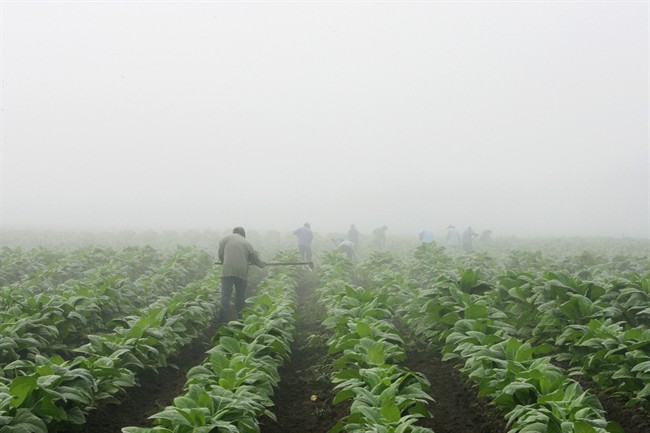The acting medical officer of health for the Windsor-Essex County Health Unit is instructing all businesses in the region to halt any plans to bring in temporary foreign workers for at least three weeks, starting Thursday.

It’s believed roughly 2,000 migrant workers will be impacted.
The action comes as the southwestern Ontario region grapples with a significant surge in COVID-19 outbreaks at agricultural enterprises.
“We have a public health emergency,” Dr. Shanker Nesathurai said at a news conference Wednesday morning.
“We have a significant burden of COVID-19 among the migrant farmworker community in Windsor-Essex. We are concerned about not having sufficient resources to provide management of the cases of the close contacts at the current time. We are concerned at the health district overall about our ability to manage the burden of disease.”
Within the span of roughly a week, the region’s self-isolation hotel, specifically for migrant workers, went from virtually empty to full. At least three additional hotels are now also being used in the self-isolation effort.
There are currently COVID-19 cases at eight agricultural enterprises, impacting 15 bunkhouses (out of 1,074 congregate living settings in the region). Roughly 275 temporary foreign workers either have COVID-19 or have been identified as a close contact and require self-isolation.
As Nesathurai explained, it’s not just the number of cases but the trajectory of cases that is of concern.
“Once a case makes its way to a congregate setting, it has a high likelihood of infecting a number of people,” he said.
“We were at zero people in the self-isolation residence last week and we saturated the self-isolation residence within days.”
While none of the workers are believed to have required hospitalization as of Wednesday, the health unit is concerned about the overall impact on the region’s health-care system. The occupancy rate at hospitals in the region is at 97 per cent, “meaning there’s very little capacity in the hospital system.”
The instruction is in effect until at least the end of day Feb. 1, though it could be extended. It calls for impacted businesses to immediately cancel, suspend or postpone any arrangements made to facilitate the arrival of temporary foreign workers between Jan. 13 and Feb. 1.
The letter also warns that failure to comply is an offence under the Reopening Ontario Act and could result in fines, charges, imprisonment and even the “closure of premises.”
When considering whether to extend the instruction beyond Feb. 1, Nesathurai said the health unit will be looking at the burden of disease on the community overall, the risk to the workers who are already here, and the capacity to manage large outbreaks.
- Canadian man dies during Texas Ironman event. His widow wants answers as to why
- ‘Sciatica was gone’: hospital performs robot-assisted spinal surgery in Canadian first
- Canadians more likely to eat food past best-before date. What are the risks?
- Invasive strep: ‘Don’t wait’ to seek care, N.S. woman warns on long road to recovery
Nicole Dupuis, CEO of the health unit, said that the City of Windsor is working with the Public Health Agency of Canada to increase self-isolation capacity.
“We are talking to our local officials, provincial and federal (officials) and those conversations continue. We are very hopeful and we know that there is some work happening.”
COVID-19 outbreaks among temporary foreign workers have been an issue throughout the pandemic and have helped to draw attention to the living conditions of migrant workers across Canada. Nesathurai said there has been continuing dialogue between stakeholders and government officials but he believes “it’s fair to say that there are clear opportunities for improvement.”
“Have there been significant changes between last year and this year? I’m not confident there have been significant changes.”
Dupuis said operators have taken measures to increase spacing or reduce the number of people in a single accommodation “but there are still quite large accommodations.”
In December, an auditor general report found that the systems intended to safeguard temporary foreign workers working in Canada’s agricultural sector have “provided little assurance of protection” for their health or safety during the pandemic.
— With a file from Global News’ Amanda Connolly













Comments